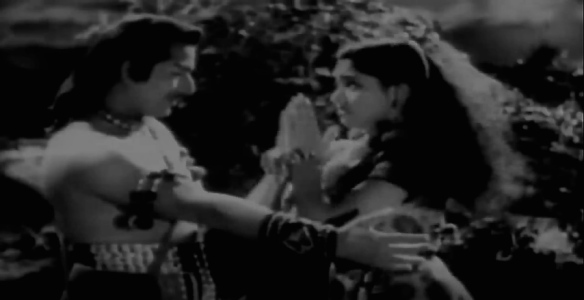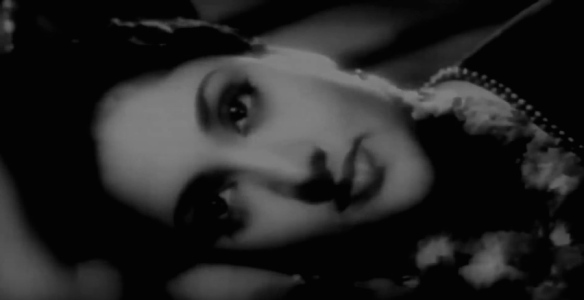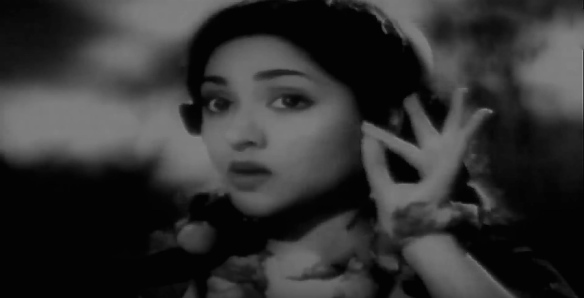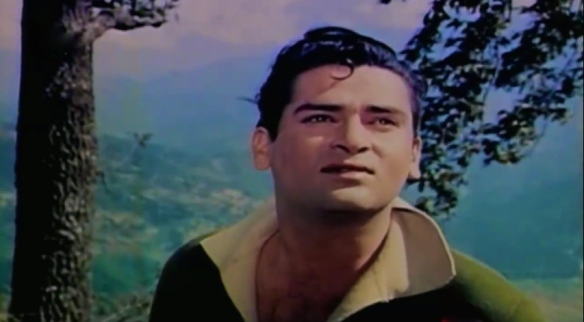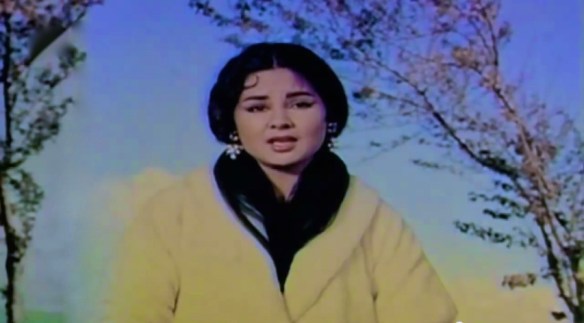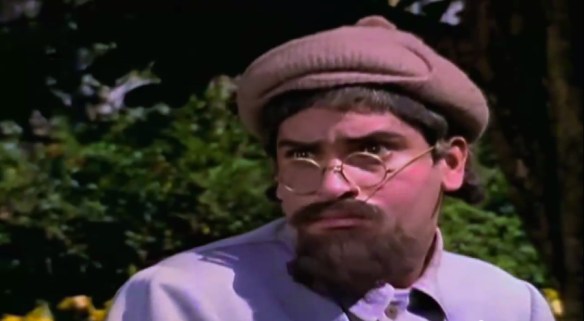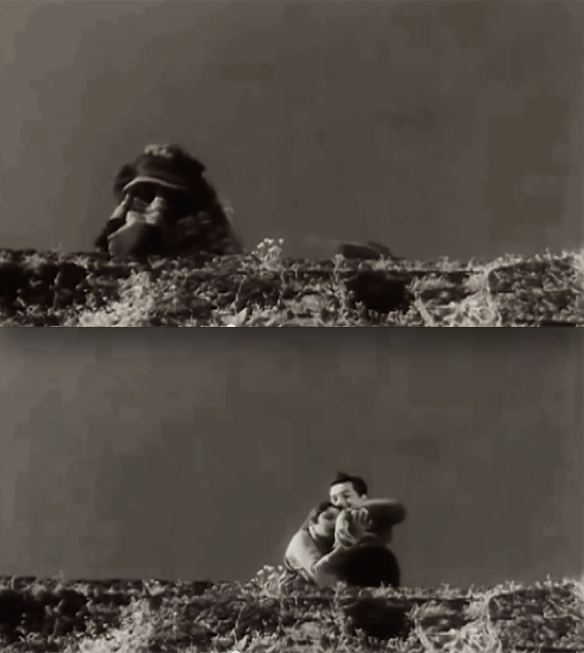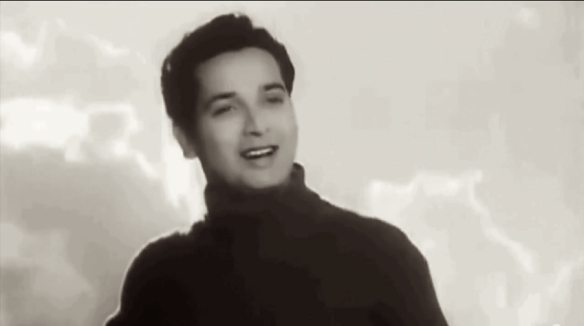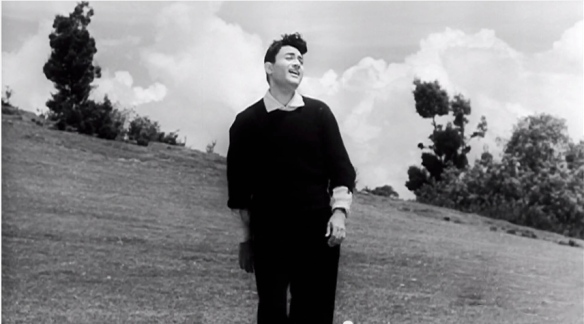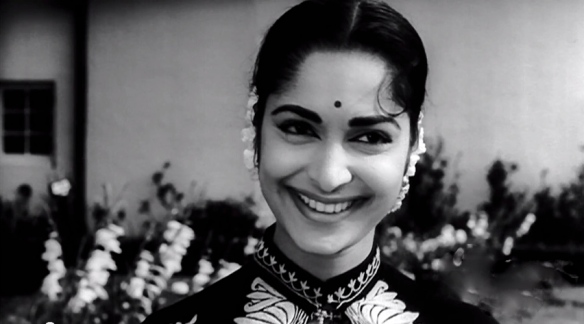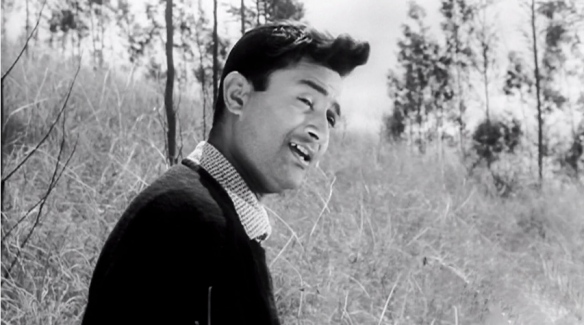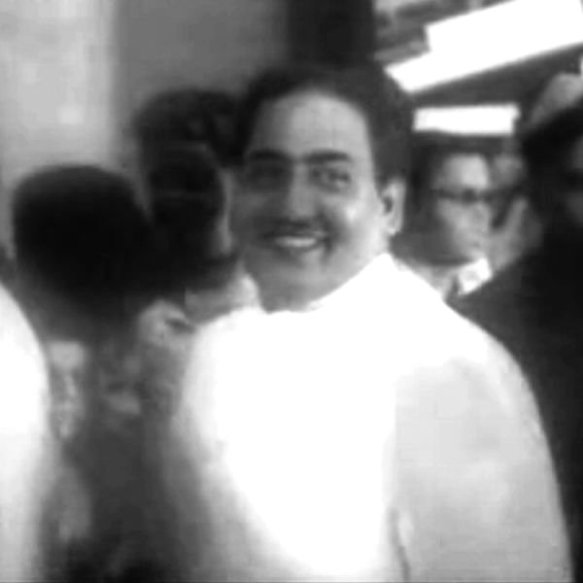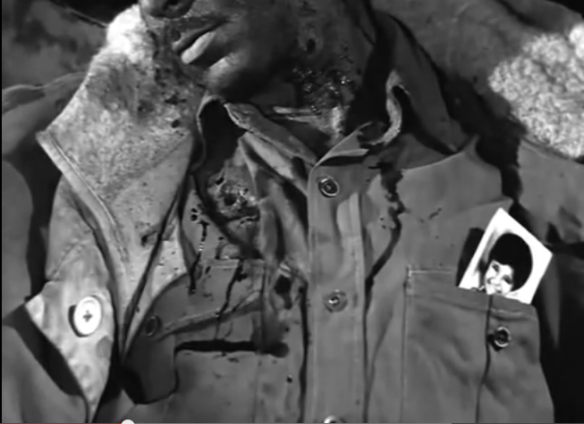
A fallen soldier carries a photo of his son during the Indo-China War of 1962 portrayed in the epic film Haqeeqat (1964)
Happy Independence Day, India! To celebrate this day, we recall the sacrifice and service of our men in uniform through the poetic call to action, “Kar Chale Hum Fida,” from the great war film Haqeeqat (1964). Starring Dharmendra, Jayant, Priya Rajvansh, and Balraj Sahni, Haqeeqat was the first film of its kind to bring audiences straight to the battlefield through the eyes of Indian soldiers (an obvious inspiration for its successful modern interpretation Border in 1997). Director Chetan Anand tells a self-described “mosaic” of a war freshly lost by India, but inspires confidence in the morale-shattered audiences with moving heroism and romance. Set in the ethereal realm of Ladakh along the border of India and China, Haqeeqat revives our hopes for the future of the still growing nation and glorifies the righteousness of Indian values even when defeated. The enemy are seen as scrawny, primitive beings with a limited vocabulary while the Indian fighters are tall, gorgeous, eloquent, and noble. Haqeeqat, meaning “reality,” portrays the real losses of the Indian army, complete with stunning battle re-enactments across the Himalayas, however, the poignancy of the film is how it turns losing a war with honor into a vastly more important moral victory.
“Kar Chale Hum Fida” bears a different kind of optimism than the “Mera Joota Hai Japani” anthem of post-independence India–an outlook now tempered by the marvels of technological and cultural advances with which the nascent country sought to keep pace and by the very real threat of encroaching communism. The song classically depicts the motherland as a new bride to be defended and death as a welcome sacrifice to preserve her honor. With godlike bravery and fortitude that surmounts all obstacles, the soldiers in “Kar Chale Hum Fida” transcend from life to death, from idealistic to divine. Hope is derived from the constant refrain that entrusts the responsibility of the nation to the next generation. Written in a flash of inspiration at 1 AM by Kaifi Azmi, the song’s tune arrived equally serendipitously to composer Madam Mohan the same night and was recorded the next morning.
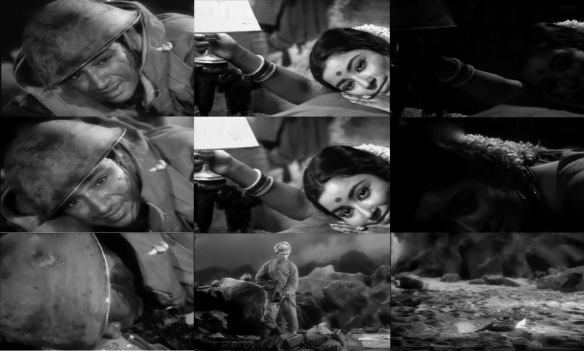
The brilliant montage of a soldier’s death with his wife turning off their bedroom lamp in Haqeeqat (1964). Trace each shot and its mis-en-scene carefully from left to right to understand the genius of this editing sequence.
Before we further discuss the lyrics to what I believe is certainly one of Kaifi Azmi’s most beautiful poems, I need to talk about a moment earlier in the film that is one of the greatest moments in film history. Note that I wrote “film history,” not merely “Bollywood film history.” This sequence is incredible and deserves a full essay. There are some moments in the human experience that can only truly be expressed through the medium of film. These are rare and a gift to any director. Most stories can be well told in prose or acted in a theatre, but the true magic of cinema lives in moments like these that fuel a film director’s dreams. In this case, film editing is the star, the juxtaposition of distinct images harkens back to Soviet montage theory when filmmakers were first exploring the possibilities of the medium. Let’s walk through this together:
Ram Swaroop plays a soldier sent to the border with a tiny boxful of earth and seeds that his young bride tells him to plant in the barren lands of Ladakh. But he is wounded mortally in the crossfire and falls on his side to the ground in a medium close-up. CUT: A reverse shot* of his wife on their bed reaching to the lamp. She flicks the light off. CUT: Reverse reaction shot of Swaroop lying on the battlefield, he smiles at her. CUT: She smiles in return, flirtatiously switching the lamp back on. She turns it off again and moves closer to him. Her eyes close as if to sleep. CUT: A gunshot is heard and Swaroop falls dead in a close-up. CUT: Wide-shot of a Chinese soldier standing over Swaroop’s body with a warm gun. CUT: Close-up of the box of earth his wife had given to him, flung to the side.
What does it mean? In 2015, we take so much about film and our common constructs for granted. Here, a man and a woman completely separated by time and space are juxtaposed back-to-back and we as an audience immediately understand what is happening. How extraordinary, if you think about it. Swaroop is imagining that he sees his wife, recalling an earlier memory of them lying together in bed. We recognize that he is dying and the symbolism of her lamp flicking on-and-off is suddenly clear. When her lamps turns off and she falls asleep, he will never awaken. It is a tantalizing moment as we are both fearful of this inevitable poetic death, but also hypnotized by her flirtatious smile and playfulness with the light. The brilliance of the editing transports us suddenly from the cold battlefield to the warmth of a bedroom and the intimacy of a couple in love. It’s a reminder of what wars are truly being fought for. We want him to join her almost as much as we need him to remain alive. The close-up of earth after Swaroop’s murder assumes the wife’s logical next position in the editing of the sequence, invoking the classic symbolism of India as a new bride whose honor is worth dying for. This is the only medium that has the power to capture this. Take a second for me with this absolutely stunning sequence and just appreciate film–film as a medium, film as poetry.
*Note: For the film nerds among us, you’ll note that the shot of Swaroop’s wife is not technically a “reverse shot.” Classical Hollywood cinema and the 180 degree principle of continuity editing tells us that for a true reverse shot, the eye lines of the subjects must match (ie. his wife’s head should in principle be on the right looking to the left), a construct with which Chetan Anand is exceedingly familiar and employed throughout the film. However, he brilliantly chose to break this rule and instead mirrors (both literally and figuratively) the shot preceding it, thus presenting an entirely alternative reality rather than a simple continuation of ideas. Am I too obsessed?
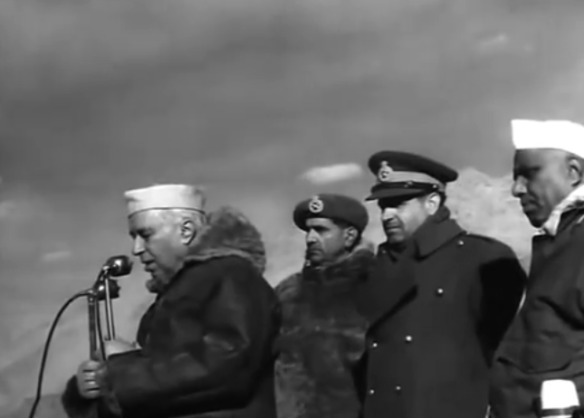
Though criticized for his failure to anticipate Chinese attacks, Prime Minister Nehru himself blesses us with a brief cameo derived from archival footage in the delightfully pro-Indian government film Haqeeqat (1964).
Sorry for that huge stream of consciousness, but the filmmaker in me had to rave (as I simultaneously wipe away tears of appreciation). MOVING ON. Like the heart-wrenching “Aye Mere Watan Ki Logon,” “Kar Chale Hum Fida” effectively celebrates heroism rather than dwell on military strategic failures. We hope you remember some of the men and women in uniform in your life today as we celebrate their sacrifices with the lyrics and English translation of “Kar Chale Hum Fida” below. The video to follow along can be found here. Enjoy!
Kar Chale Hum Fida Lyrics and Translation:
Kar chale hum fidaa jaan-o-tan saathiiyo
We are finished sacrificing our lives and bodies, companions
Ab tumhaare hawaale watan saathiiyo.N
Now we entrust the country to you, companions
Saa.Ns thamtii gayii, nabz jamti gayii, phir bhi baDhte qadam ko na rukhne diyaa
Our breaths kept halting, our pulses kept congealing, but we did not allow our advancing footsteps to pause
KaT gaye sar hamaare to kuch gham nahii.N, sar Himaalaya ka humne na jhukne diyaa
If our heads were cut, we felt no sorrow, for we did not allow the head of the Himalayas to bow
Marte marte rahaa baa.Nkpan saathiiyo
As we died, our chivalry remained, companions
Ab tumhaare hawaale watan saathiiyo
Now we entrust the country to you, companions
Zindaa rahne ke mausam bahut hai.N magar jaan dene ki rut roz aati nahii.N
There are many seasons to live, however, the time to give your life does not come every day
Husn aur ishq dono.N ko ruswaa kare woh jawaanii jo khoo.N mei.N nahaatii nahii.N
What displeases beauty and love are youth that do not bathe in blood
Aaj dhartii bani hai dulhan saathiiyo
Today the earth became our bride, companions
Ab tumhaare hawaale watan saathiiyo
Now we entrust the country to you, companions
Raah qurbaniyo.N kii na viraan ho, tum sajaate hii rehnaa naaye qaafile
Let the path of sacrifice not become barren, you must continue to adorn it with new processions
Fateh ka jashn is jashn ke baad hai zindagii maut se mil rahii hai.N gale
The celebration of victory is after this victory in which life and death are embracing
Baa.Ndh lo apne sar se qafan saathiiyo
Tie the funeral shroud upon your heads, companions
Ab tumhaare hawaale watan saathiiyo.N
Now we entrust the country to you, companions
Khe.Nch do apne khuu.N se zameen par lakeer,* is taraf aane paaye na Raavan koi
Draw out a line upon this earth with your blood and do not let any demons come this way
ToD do haath agar haath uThne lage, chuu.N na paaye na Sitaa kaa daaman koii
Break the enemy’s hand if his hand raises [against you] and let no one dishonor Sita
Raam bhi tum, tum hii Lakshman saathiiyo.N
You are both Ram and Lakshman, companions
Ab tumhaare hawaale watan saathiiyo.N
Now we entrust the country to you, companions
Kar chale hum fidaa jaan-o-tan saathiiyo
We are finished sacrificing our lives and bodies, companions
Ab tumhaare hawaale watan saathiiyo.N
Now we entrust the country to you, companions
Glossary:
kar chalnaa: to depart; fidaa: sacrifice; jaan: life; tan: body; saathii: companion; [kisi ke] hawaale: [in someone’s] care; watan: country; saa.Ns: breath; thhamnaa: to stop; nabz: pulse; jamnaa: to solidify, to freeze; baDhnaa: to advance; qadam: footsteps; [kisi ko] rukhne diyaa: to allow [something] to stop; kaT; cut; sar: head; gham: sorrow; Himaalaay: Himalayan mountains; jhuknaa: to bow; marnaa: to die; baa.Nkpan: chivalry; zindaa rehnaa: to remain living; mausam: season; rut: time, season; roz: every day; husn: beauty; ishq: love; ruswaa: disgrace; jawaanii: youth; khoo.N: blood; nahaanaa: to bathe; dhartii: earth; dulhan: bride; raah: path; qurbaanii: sacrifice; viraa.N: barren, wasteland; sajaanaa: to decorate; qaafile: gathering, procession; fateh: victory; jashn: celebration; [kisi ke] baad: after [something]; maut: death; gale milnaa: to embrace; baa.Ndhnaa: to tie; qafan: funeral shroud; khe.Nchnaa: to pull, to draw; zameen: earth; lakeer: line; taraf: side, toward; raavaan: mythological demon of the Ramayan; toDnaa: to break; haath: hand; uThnaa: to raise; chuu.Nnaa: to touch (in this sense, referring to the dishonorable act of touching Sita’s garments); Sitaa: Queen of Ayodha, wife of Lord Rama; [kisi ka] daaman: end of [someone’s] skirt or garment, [someone’s] company; Raam: Lord Ram, King of Ayodha; Lakshman: brother of Ram, entrusted to protect Sita in the Ramayan
*This is a reference to the ancient myth of the Ramayana in which Lord Rama draws a white circle in the ground through which his enemy, Ravana, cannot pass. As long as his wife Sita, the embodiment of Indian womanhood, remained behind this line, she would remain safe (of course, she is tricked into leaving it or we wouldn’t have a story). Lakshman, Rama’s brother, protects Sita at her side while Rama is away. Both brothers, the offense and defense, are critical to preserving Sita’s honor in the Ramayana.
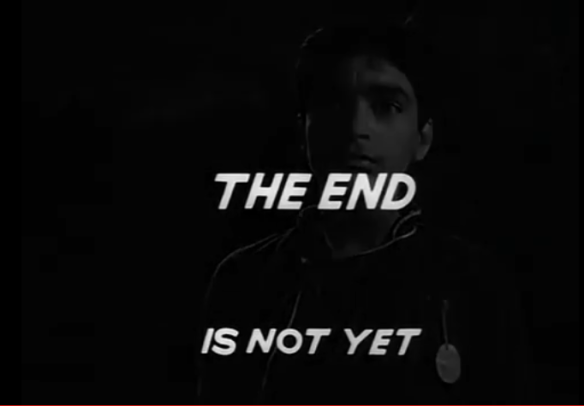
At the end of Haqeeqat (1964), the film fades to black over the battle-scarred face of a younger generation with the words, “THE END IS NOT YET.” Bold move, title card designer guy. Bold move.
This song is dedicated to my late grandfather, a Major-General in the Indian Army, who became an orphan at the age of 12, survived the Partition of India in 1947, fought on the fronts of the Indo-China War of 1962, and received the Ati Vishisht Seva Medal for his service in the Corps of Military Intelligence during the Indo-Pakistani War of 1971. He eventually retired with 3 children and 5 grandchildren who still strive to be as elegant and brave a human being as him.
– Mrs. 55
